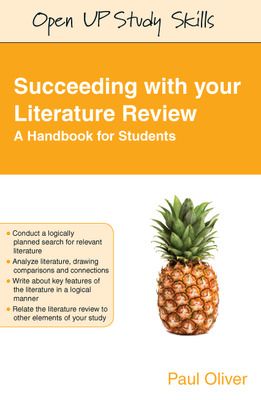Succeeding with your Literature Review: A Handbook for Students
1st Edition
0335243681
·
9780335243686
© 2012 | Published: February 16, 2012
"An excellent and accessible text that will help all students and scholars to develop a strong review and enable them to outline and analyse the key ideas for their study. The structure of the book is really well thought out and the chapters are writ…
Read More
Request Review Copy
Receive via shipping:
- Colour, print bound version of the complete text
1. The Nature and Purpose of a Literature Review
2. The Content of a Literature Review
3. Doing a Literature Search
4. How to Select Literature for Inclusion
5. Analyzing and Categorizing the Literature Critically
6. The Structure of a Literature Review
7. Writing the Review
8. Relating the Review to the Rest of the Dissertation
2. The Content of a Literature Review
3. Doing a Literature Search
4. How to Select Literature for Inclusion
5. Analyzing and Categorizing the Literature Critically
6. The Structure of a Literature Review
7. Writing the Review
8. Relating the Review to the Rest of the Dissertation
"An excellent and accessible text that will help all students and scholars to develop a strong review and enable them to outline and analyse the key ideas for their study. The structure of the book is really well thought out and the chapters are written in a way which readers will find helpful and easy to understand. I would highly recommend this book to research students."
Professor Mark Brundrett, Liverpool John Moores University, UK
Professor Mark Brundrett, Liverpool John Moores University, UK
This step-by-step handbook provides comprehensive and practical guidance on the process of researching a range of relevant literature on a subject, as well as planning and writing a literature review. The book takes a student friendly approach to offer complete novices a simple review of a process which is often central to producing a research study.
Succeeding with your Literature Review will enable you to:
- Design a literature review which is related to the main facets of a research project
- Conduct a logically-planned search for relevant literature
- Determine which literature is most suited to inclusion in your study
- Analyse the literature, drawing comparisons and connections where appropriate
- Appraise the strengths and weaknesses of relevant literature
- Write logically and rationally about the key features of literature
- Write a literature review in a sound academic style
- Understand how to relate a literature review to other elements of your study or dissertation
Succeeding with your Literature Review is relevant in all subject areas and is essential reading for third year undergraduate and postgraduate students.

